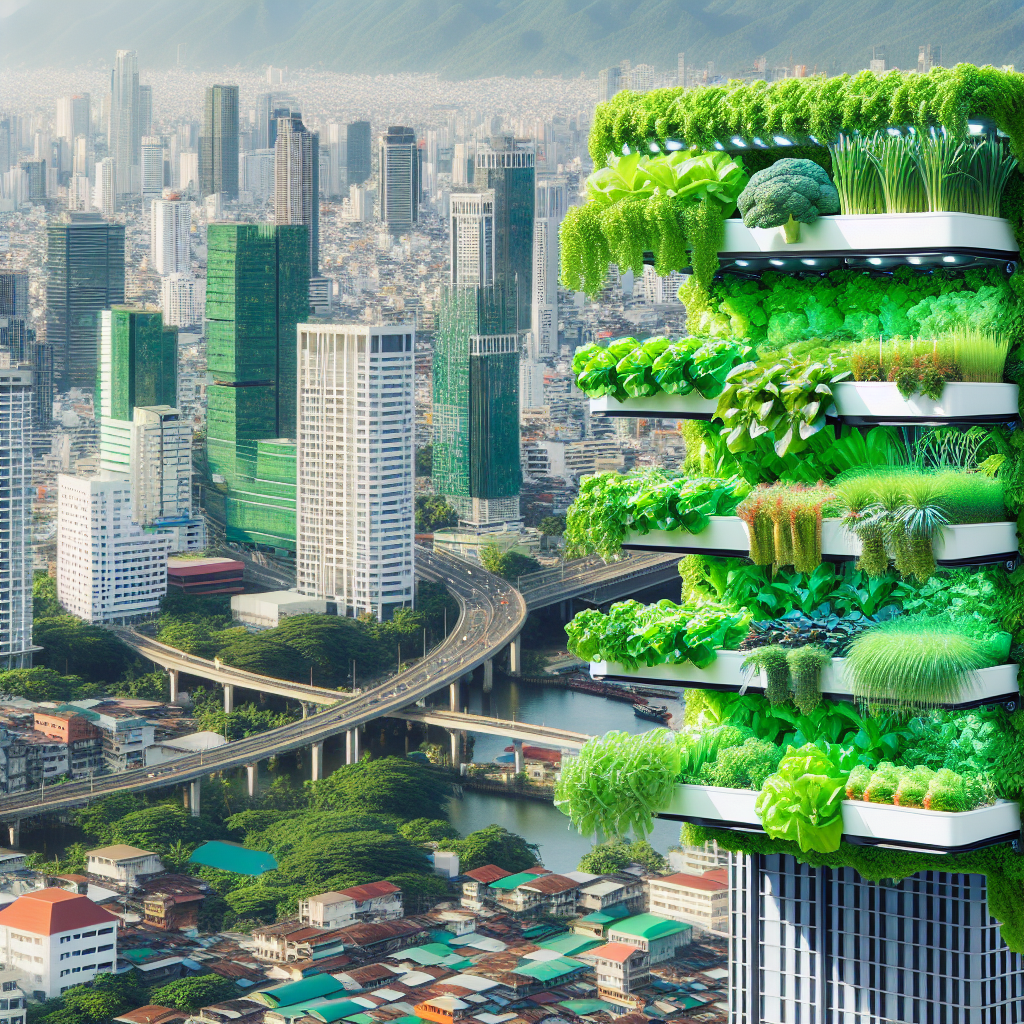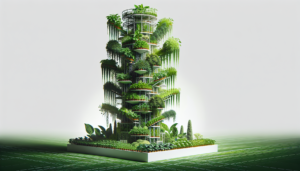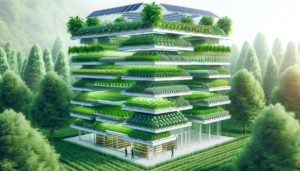
Imagine a city where sprawling skyscrapers house lush green gardens, and the air is filled with the comforting scent of fresh produce. This is the future of vertical farming in Jakarta, a visionary concept that holds the potential to transform the way we think about agriculture in urban environments. In this article, we will explore the exciting possibilities that vertical farming brings to Jakarta, uncovering the benefits it can offer for sustainable food production, resilience against climate change, and the creation of a healthier, greener city for all. Get ready to be inspired as we embark on a journey into the future of farming in the Indonesian capital.
Overview of Vertical Farming
Definition of vertical farming
Vertical farming is a revolutionary agricultural practice that involves cultivating crops in vertically stacked layers, using methods such as hydroponics or aeroponics. This innovative approach maximizes limited space and utilizes advanced technologies to provide a controlled environment for plant growth.
Benefits of vertical farming
Vertical farming offers numerous advantages for urban areas like Jakarta. Firstly, it significantly increases crop yield per square meter, making efficient use of limited land availability. Secondly, it reduces the need for pesticides and herbicides, resulting in healthier, pesticide-free produce. Additionally, vertical farms require less water compared to traditional farming methods, contributing to water conservation efforts. Lastly, vertical farming allows for year-round cultivation, ensuring a consistent supply of fresh and locally grown produce to meet the city’s growing demand.
Current global trends in vertical farming
The global vertical farming market has experienced rapid growth in recent years. This can be attributed to the increasing need for sustainable agricultural practices, especially in densely populated urban areas. The market is witnessing advancements in technology, including the development of automated systems, smart sensors, and artificial intelligence to optimize crop production. As more cities strive for food security and environmental sustainability, vertical farming has gained traction as a viable solution.
Challenges and Opportunities in Jakarta
Limited land availability
One of the primary challenges facing urban agriculture, including vertical farming, in Jakarta is the scarcity of land. As an expanding metropolitan city with a growing population, available land suitable for agriculture is diminishing. Vertical farming presents a potential solution by utilizing vertical space and adapting to the constraints of limited land availability.
Rapid urbanization and population growth
Jakarta is experiencing rapid urbanization and population growth, posing significant challenges for traditional farming. As the city becomes more urbanized, there is a need for innovative solutions to meet the rising demand for fresh produce. Vertical farming provides an opportunity to grow crops locally within the city, reducing the reliance on long-distance transportation and ensuring a steady supply of nutritious food.
High demand for fresh produce
As the capital of Indonesia, Jakarta has a high demand for fresh and quality produce. However, meeting this demand and maintaining a sustainable supply chain poses logistical challenges. By implementing vertical farming, the city can reduce its dependence on imported produce and strengthen its food security while providing residents with locally grown, nutritious options.
Growing interest in sustainable agriculture
There is a growing interest in sustainable agriculture practices in Jakarta, with an increasing number of individuals and communities recognizing the environmental benefits of vertical farming. The concept of growing food in a controlled environment without relying on harmful chemicals is gaining popularity. This interest presents an opportunity for vertical farming startups and established farms to collaborate and meet the demand for sustainable agriculture.
Government Initiatives
Support for urban agriculture
The Jakarta government recognizes the importance of urban agriculture, including vertical farming, and has taken initiatives to support and encourage its development. The government has allocated land for urban farming projects and provides assistance in the form of training programs, subsidies, and technical expertise. These efforts aim to promote sustainable food production methods and create a vibrant urban farming ecosystem in the city.
Incentives for vertical farming startups
To foster entrepreneurship and innovation in vertical farming, the Jakarta government offers various incentives to startups entering the industry. These incentives include tax breaks, access to funding, and streamlined bureaucratic processes. By providing support for vertical farming startups, the government aims to encourage the growth of the sector and stimulate economic development.
Collaboration with international organizations
The Jakarta government actively collaborates with international organizations that specialize in sustainable agriculture and vertical farming. These partnerships facilitate knowledge transfer, technological exchange, and best practice sharing. By leveraging expertise from around the world, Jakarta aims to develop cutting-edge vertical farming systems and establish itself as a global leader in sustainable agriculture.
Technological Innovations in Vertical Farming
Hydroponics: The future of soil-less agriculture
Hydroponics is a core technique in vertical farming, involving the cultivation of plants without soil by providing a nutrient-rich water solution. This method conserves water and nutrients, maximizes space utilization, and eliminates the need for pesticides or herbicides. With advancements in hydroponic systems and nutrient delivery methods, it has become a major driving force in the future of vertical farming in Jakarta.
Automation and robotics in vertical farms
The integration of automation and robotics in vertical farms has revolutionized crop production. Automated systems can optimize various aspects of farming, such as monitoring plant health, adjusting climate conditions, and managing nutrient delivery. Robotic technologies also enable efficient harvesting and minimize labor requirements. By harnessing automation and robotics, vertical farms in Jakarta can increase productivity, reduce costs, and ensure consistent crop quality.
Artificial intelligence for optimized crop production
Artificial intelligence (AI) plays a crucial role in optimizing crop production in vertical farms. AI algorithms analyze data collected from sensors, cameras, and climate control systems to make informed decisions regarding plant growth, resource allocation, and pest control. Implementing AI-driven solutions in vertical farms enhances efficiency, crop yield, and overall sustainability. Jakarta can leverage AI technologies to refine its vertical farming practices, further improving agricultural output and resource management.
Success Stories of Vertical Farming in Jakarta
Indonesia’s first commercial vertical farm
Indonesia’s first commercial vertical farm, located in Jakarta, has set a precedent for urban agriculture in the region. This innovative farm utilizes vertical space to grow a variety of leafy greens and herbs. By adopting hydroponics and automation technologies, the farm has achieved high productivity while minimizing resource consumption. Their success has inspired other vertical farming startups in Jakarta, creating a positive ripple effect in the industry.
Vertical farm startups revolutionizing agriculture
Several vertical farm startups in Jakarta are revolutionizing agriculture by implementing innovative techniques and technologies. These startups focus on sustainable practices, maximizing limited space, and producing high-quality crops. By employing vertical farming methods, they are able to meet the city’s demand for fresh produce while minimizing the ecological footprint traditionally associated with agriculture.
Collaboration between farmers and technology companies
In Jakarta, collaboration between traditional farmers and technology companies has proved beneficial for both parties. By integrating the knowledge and experience of farmers with cutting-edge technologies, such as automation and precision farming, the efficiency and productivity of vertical farms have significantly increased. This collaborative approach ensures the continuity and sustainability of farming practices in Jakarta.
Environmental Sustainability
Reducing carbon footprint with vertical farming
Vertical farming offers significant environmental benefits by reducing carbon emissions associated with traditional farming practices. By grow







